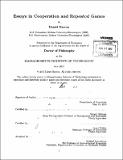Essays in cooperation and repeated games
Author(s)
Barron, Daniel (Daniel Vincent)
DownloadFull printable version (8.201Mb)
Other Contributors
Massachusetts Institute of Technology. Department of Economics.
Advisor
Robert Gibbons and Juuso Toikka.
Terms of use
Metadata
Show full item recordAbstract
This dissertation explores cooperation when formal contracts and legal institutions are imperfect. The first chapter (co-authored with Isaiah Andrews) considers how a principal allocates business among a group of agents to motivate them in the context of a repeated game with imperfect private monitoring. If players are impatient, the optimal relational contract dynamically allocates future business among agents depending on past performance. An optimal allocation rule favors an agent who performs well, even if he later performs poorly. An agent loses favor only if he is unable to produce and his replacement performs well. The principal may allows some relationships to deteriorate into persistent shirking in order to better motivate other agents. We find conditions under which the principal either does or does not benefit by concealing information from the agents. The second chapter proves that approximately Pareto efficient outcomes can be sustained in a broad class of games with imperfect public monitoring and Markov adverse selection when players are patient. Consider a game in which one player's utility evolves according to an irreducible Markov process and actions are imperfectly observed. Then any payoff in the interior of the convex hull of all Pareto efficient and min-max payoffs can be approximated by an equilibrium payoff for sufficiently patient players. The proof of this result is partially constructive and uses an intuitive "quota mechanism" to ensure approximate truth-felling. Under stronger assumptions, the result partially extends to games where one player's private type determines every player's utility. The final chapter explores how firms might invest to facilitate their relationships with one another. Consider a downstream firm who uses relational contracts to motivate multiple suppliers. In an applied model with imperfect private monitoring, this chapter shows that the suppliers might "put the relationship first:" they invest to flexibly produce many of the products required by the downstream firm, rather than cutting costs by specializing. A downstream firm that relies on relational contracts tends to source from fewer suppliers, each of whom can inefficiently manufacture many different products required by that firm.
Description
Thesis (Ph. D.)--Massachusetts Institute of Technology, Dept. of Economics, 2013. Cataloged from PDF version of thesis. Includes bibliographical references (p. 143-149).
Date issued
2013Department
Massachusetts Institute of Technology. Department of EconomicsPublisher
Massachusetts Institute of Technology
Keywords
Economics.